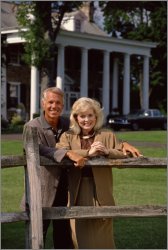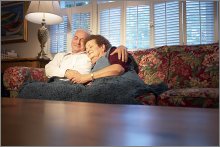Reverse Mortgages:
What Exactly Are They, Who Are They Best For?
by www.SixWise.com
Reverse mortgages are becoming increasingly popular in America,
but many are still unsure what exactly they are, and who stands
to benefit.
"It's a buzz word," said Dean Wegner, a mortgage
expert. "'Hey, I got a reverse mortgage,' so they're
going with the flow, and I don't know if everybody actually
understands, completely understands a reverse mortgage."
|

Older adults who are "house-rich and cash-poor"
can benefit from the extra cash flow a reverse mortgage
provides.
|
What is a Reverse Mortgage?
A reverse mortgage allows you to get extra cash each month
without having to pay it back immediately or sell your home.
In a regular mortgage, you pay your lender each month and
your debt decreases while your home's equity increases.
With a reverse mortgage, the lender pays you each month and
you're not required to pay it back until you die, sell your
home or no longer live in the home as your primary residence.
Who Should Consider a Reverse Mortgage?
Simply speaking, a reverse mortgage allows older Americans
an opportunity to convert part, or all, of the equity in their
homes into cash.
"What happens as a result is that people outlive their
assets," said Richard Down, a reverse mortgage specialist
at M&T Bank Central New York. "Doctors and medical
technology are keeping a lot of people above the daisies ...
A reverse mortgage is a cash flow solution for senior citizens,"
he said.
To qualify for a reverse mortgage, you must be at least 62
years old, live in your home, and own it. The loan is generally
tax-free and can be used however you like, to finance a home
improvement project, supplement retirement income, pay for
health care bills, etc.
Seniors who are choosing reverse mortgages are typically
"house-rich and cash-poor," and the mortgage gives
them the extra cash they need after retirement.
How Does it Work?
If you decide to get a reverse mortgage, the cash can be
paid to you in a lump sum, as a monthly cash advance, as a
"creditline" account that lets you decide how much
is paid out, or a combination of the above.
When the debt becomes due -- either because you die, sell
your home or no longer live in it primarily -- you may owe
a large amount, so you may receive little or no equity from
your home.
However, you can never owe more than the value of your home
at the time the loan is repaid. Reverse mortgages are usually
"nonrecourse," meaning that the lender only has
rights to your home (not your income, other assets, or income
of your heirs).
If the loan needs to be repaid because of death, your heirs
can either pay it back using their own funds, by selling your
home, or by selling other assets from your estate.
Three Types of Reverse Mortgages
|

Payment is not due on a reverse mortgage until you
sell your home, die or no longer live in it as your
primary residence, but be aware that by this time there
may not be much (or any) equity left from your home
for you or your heirs.
|
Here is a breakdown of the three basic types of reverse mortgages
you're likely to encounter:
-
Single-purpose reverse mortgages: Offered by
some state and local government agencies and non-profit
organization, these mortgages generally have low costs.
However, they're only available in some areas, you generally
need a low to moderate income to qualify, and they must
be used for a specific purpose, which is specified by
the government or non-profit lender. They can be used
for things like home
repairs or improvements, or property taxes.
-
Federally-insured reverse mortgages: These mortgages
are called Home Equity Conversion Mortgages (HECMs), and
are backed by the U. S. Department of Housing and Urban
Development (HUD). They have no income qualifications
and are widely available, but you must meet with a counselor
from an independent government-approved housing counseling
agency before applying for the loan.
-
Proprietary reverse mortgages: Also widely available
with no income restrictions, these reverse mortgages are
private loans that are backed by the companies that develop
them. Though you may be able to get a larger loan at a
lower total cost from an HECM, if you own a high-value
home, you may be able to get a larger loan advance using
a proprietary reverse mortgage.
Some Things to Consider
Before you decide to cash in on your home's equity, please
be aware of these important facts from the Federal Trade Commission:
-
Under the HECM program, the borrower is allowed to live
in a nursing home or other medical facility for up to
one year before the loan must be paid back.
-
Your debt will increase over time, as interest is charged
on the outstanding balance and added to the amount you
owe each month.
-
Lenders typically charge origination fees, closing costs
and, perhaps, other service fees for a reverse mortgage.
-
A reverse mortgage can use up all or some of your home's
equity. This means you'll have fewer assets left for yourself,
or, upon your death, to leave to your heirs (however,
you will not owe more than the value of your home when
the loan is repaid).
-
If you do not maintain homeowner's insurance or pay your
property taxes, the loan may become due.
Recommended Reading
The
Secret Way to Add Value to Your Home: It's Easy, Relatively
Inexpensive & Beautiful!
Roth
IRA: If You Don't Have One, Here's Why You Should Seriously
Consider One... Especially NOW
Sources
AARP:
A New Kind of Loan: In Reverse
U.S.
Department of Housing and Urban Development
Federal
Trade Commission
AZFamily.com
Oswego
County Business Magazine